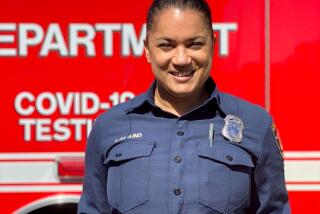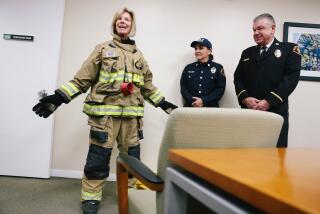In this world of sexless occupational terms, just why canât a woman be more like a man?
In writing a few weeks ago about my day as honorary fire chief, in which we covered a great part of the city by helicopter, I ended by reflecting on its vastness:
âIt is a fantastic realm; more fabulous than many an ancient kingdom; more prosperous than many a modern state.
âWe should indeed appreciate our excellent firemen, who are trying to keep us from burning it down.â
I have received the following letter from Ann Reiss Lane, president of the Fire Commission:
âThe Los Angeles City Fire Department has not only men but women in the ranks. To reduce confusion, we call them all firefighters.
âLoved your column, but we obviously gave you inadequate training for the job. Come back for another visit and weâll introduce you to our 12 women firefighters.â
First, I am obliged to exonerate the personnel of the Fire Department, from the chief on down. They made it clear to me that there are women as well as men in the firefighting units, and that they are called firefighters, not firemen.
Of course I already knew that, since I have long been interested in the feminist campaign to alter traditional occupational titles, with the notion that this arbitrary manhandling (excuse it) of the language will make it easier for women to find work in what once was thought of as a manâs world.
The silliest example I can think of is freshperson , for freshman , which benighted administrators actually tried to introduce on some college campuses.
This craze also reached the depths of absurdity when the Del Mar City Council changed the name of manholes to sewer access structures, evidently with the idea of making it easier for women to work in sewers.
When the womenâs movement was riding high, this demasculinization of the language was endemic, so that government bodies at every level were trying to outdo one another in thinking up sexless titles for civic employees. Lists were published of these new titles, mostly made up of nouns strung together, further sinking the language into gobbledygook.
Remember the telephone lineman? As I once wrote, âWith those spiked boots for climbing telephone poles and the tools of his trade hanging from his belt, he was reminiscent of the gunfighter, another legendary figure with whom he shared the winning of the West.â
Do you know what General Telephone decided to call its linemen? âPlant construction installers.â
I know women do this work now. I watched a young woman work at the top of a pole in our neighborhood the other day. She had no trouble climbing it and she seemed to know what she was doing up there. I thought of her as a lineman, not a plant construction installer.
Why canât a woman telephone lineman be called a lineman? It was an earlier generationâs attempts to feminize occupational titles that gave us such monstrous words as authoress, aviatrix and even doctoress. Today, happily, women may be called authors, aviators and doctors, and no one thinks of such words as sexist or masculine.
There is hope, though, that the trend has been reversed. Sanity may have been restored when the U. S. Navy decided to call its women cadets midshipmen , the traditional name for undergraduates in the Naval Academy at Annapolis.
In World War II the Marine Corps called its women enlistees âwomen Marinesâ; but later they saw that there was no need for that. They didnât call men âmen Marines,â did they? So now the women are simply Marines; and I believe that enlistees in the Army and Navy are called soldiers and sailors.
At one time it was the vogue to change the suffix of all words ending in man to person . Though the absurd chairperson and all such person- words may in good time die of their own absurdity--like âperson overboardâ--such forms still abound. I have seen cow person, cave person, and Portuguese-person-of-war.
Wondering about all this, I telephoned the Naval Academy at Annapolis the other day and talked to a woman in the public information office. I asked her how women cadets had adjusted to the name midshipman , whether they resented it.
âNo resentment whatever,â she assured me. âItâs midshipman. Thatâs what they are. They donât resent it, and they do fine.â
She pointed out that a woman had been named top of the class last year, which is surely the end of an ancient tradition.
If women can get into Annapolis and go through it without being called something ridiculous like midshippersons, or shipfighters, I donât see any reason why women canât be firemen.
Fireman is a word that goes deep in American legend. The fireman perhaps has been the most durable and least corrupt of our heroes. The fireman is still a role model for small children; and there is no reason why a fireman canât be a woman.
I admit that words ending in man donât work well for women if the accent is on the man. But newspaperman easily becomes newspaperwoman, or journalist; policewoman seems to be unobjectionable, just as firewoman might be.
But evidently the Los Angeles Fire Department has made firefighters official. It is an unobjectionable word, if indeed the women so designated actually fight fires.
So I am willing to go along with Ann Reiss Lane and call the whole force firefighters, even though only 12 of them are women.
In a crisis, though, when my house is burning down, Iâm afraid, like most everyone else, Iâll be shouting, âFireman, save my child!â
More to Read
Sign up for Essential California
The most important California stories and recommendations in your inbox every morning.
You may occasionally receive promotional content from the Los Angeles Times.










